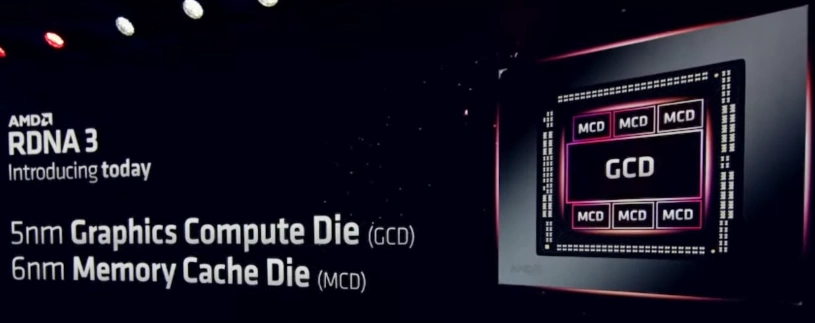While the original intention might have been to use 3D V-Cache in the AMD Radeon RX 7000 series, GPU performance issues means AMD might push it to next generation, if not scrap it completely.
When AMD released AMD Ryzen 7 5800X3D, it completely changed how CPUs could process gaming and other things. The reason was simple, it came with an extra layer of 64MB cache stacked on top of the usual 32MB L3 cache. AMD connected these cache chips with a through-silicon via (TSV) connector, which allowed these chips to have a very small amount of space between each other.
The results were extremely impressive. AMD Ryzen 7 5800X3D was among the fastest gaming CPU of the generation. Beating other CPUs which were far faster, expensive and powerful in raw performance. Only and only because of its extra L3 cache, which many games would efficiently utilize. So impressive were the sales and results, that AMD decided to release three new chips in the AMD Ryzen 7000 CPU series. The AMD Ryzen 7950X3D, 7900X3D and 7800X3D.
Looking at the results, AMD might have thought, why not implement the same technology in its graphics cards. Looks like AMD not only thought that, but it seems they almost implemented it.
AMD Radeon RX 7000 Almost Had 3D V-Cache

Tom’s Hardware explains that a senior semiconductor expert, Tom Wassick has revealed something really interesting. When he opened up the AMD Radeon RX 7900 XT graphics card and did some imaging tests, he found two important things.
First thing he found that while AMD Radeon RX 7900 XT came with 6 cache chiplets, only 5 were active and one was just an empty silicon. Those unaware, AMD Radeon RX 7000 series comes with a new chiplet design, where cache and graphics processor are different chiplets and connected to each other forming a single GPU, if one can call that. While it was known from the start that RX 7900 XT comes with only 5 active cache chiplets, unlike the RX 7900 XTX which comes with 6, what’s next is the most interesting part.
The second thing he found was that these caches came with the same TSV connection points which AMD used in it’s X3D CPUs like Ryzen 5800X3D and others. The pitch too was the same. He wonders if AMD was considering to include stacked 3D V-Cache on the Radeon RX 7000 graphics cards too.
This massive findings bring a big question to the fore. Why AMD did implement its base but did not implement the actual 3D V-Cache on the cards. It also brings in the question whether AMD could still bring this stacked cache in current generation of graphics cards.
Reason Why AMD Radeon RX 7000 Didn’t Implement 3D V-Cache
For the answer to above, one has to look at the tweet by known Twitter based leaker @Kepler_L2. This reply is something most sites haven’t reported on.
Kepler_L2 reveals that this implementation of 3D V-Cache by AMD was known from a year. But he says that it will likely never come out because of the Navi 31, that is GPU used in AMD Radeon RX 7900 XTX and RX 7900 XT is not reaching its true performance abilities.
In Kepler_L2’s reply to another Twitter user, he explains it further that the GPU used in these cards is too slow to benefit much from increased cache. Hence, AMD never implemented it.
It is unknown if AMD still wants to use this stacked 3D V-Cache on current or next-gen Radeon graphics cards. But if AMD does implement it, the performance benefits could be something to eagerly look at.
- Matt
-

 1
1



3175x175(CURRENT).thumb.jpg.b05acc060982b36f5891ba728e6d953c.jpg)
Recommended Comments
There are no comments to display.
Join the conversation
You can post now and register later. If you have an account, sign in now to post with your account.
Note: Your post will require moderator approval before it will be visible.